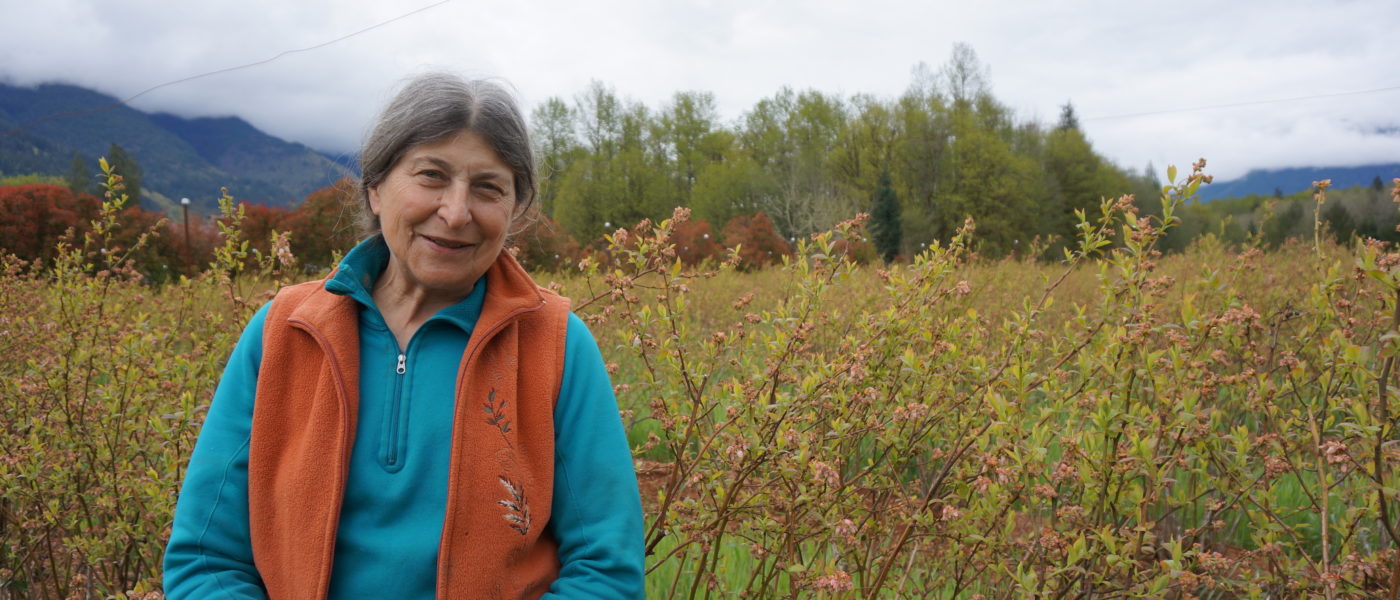In the northwest corner of Washington State, the mighty Skagit river meanders from the Cascade mountains and slowly descends to the Salish Sea (Puget Sound), creating a wildly fertile valley as it goes. The western end of the Skagit Valley is wide flatlands with some of the most fertile farming land in the country. It’s where you’ll find the famous Skagit tulip fields, 75% of the country’s spinach and cabbage seed and nearly 95% of the beet seed. [1] Most of the farms are family farms, and they tend to be small by the standards of other farming communities in the country – most are under 50 acres.[2]
As you head East, the Valley narrows slowly until, about 60 miles in, the Skagit has transformed into a rushing, majestic mountain river. Before the valley narrows too much, though, you’ll find Blue Heron Farm, an organic farm nestled in the foothills of the Cascades. Blue Heron’s owner, Anne Schwartz, has been farming in this small, “upriver” community for 44 years. Talk to any organic farmer, or most likely any farmer at all in the Skagit Valley, and they are bound to know Anne. She’s a cornerstone of the farming community in the Skagit Valley.
Blue Heron Farm is a diverse organic farm. Anne’s downsized in the past few years to 2 acres of vegetable and fruit and 2 acres of nursery crop (she grows bamboo); she owns some of the land, and leases some. She has sold her produce and bamboo to many different markets over the years – farmers markets, restaurants, co-ops near and far, and the local environmental learning center. She’s tried almost every market imaginable in her 44 years of running her own business. “You kind of grow into your market, where it seems like you’re not losing money,” she reflects. These days when the blueberries are on, you can find hers at a handful of co-op grocery stores and in a local CSA.
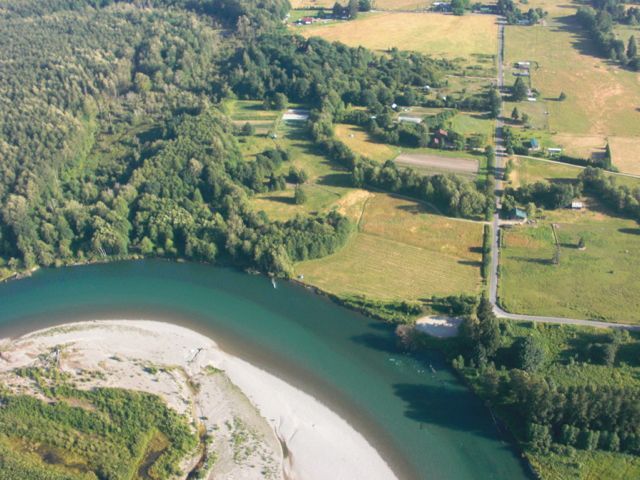
Aerial view of Blue Heron Farm
Anne has been a farmer her whole adult life, but she doesn’t come from a farm family. Her first taste of growing food was with her neighbors where she grew up in New Jersey. When the new neighbors moved in, they turned their entire backyard into a vegetable garden. An older Italian couple, they appreciated Anne’s help, by which she started learning about growing food. Eventually, she came to Washington State University (WSU), studying animal sciences, and when she didn’t get into Veterinary school after her undergraduate degree, she went to work at a local dairy.
In her work with cows and their calves, Anne applied herd health practices she learned at WSU; it was very rewarding and she fell in love with the work. She had already gotten involved in activism on issues like animal welfare, factory farming, and pesticides, and she liked dairy because, as she puts it, “It was the only livestock field where if they didn’t treat the animals well, they wouldn’t produce as much.”
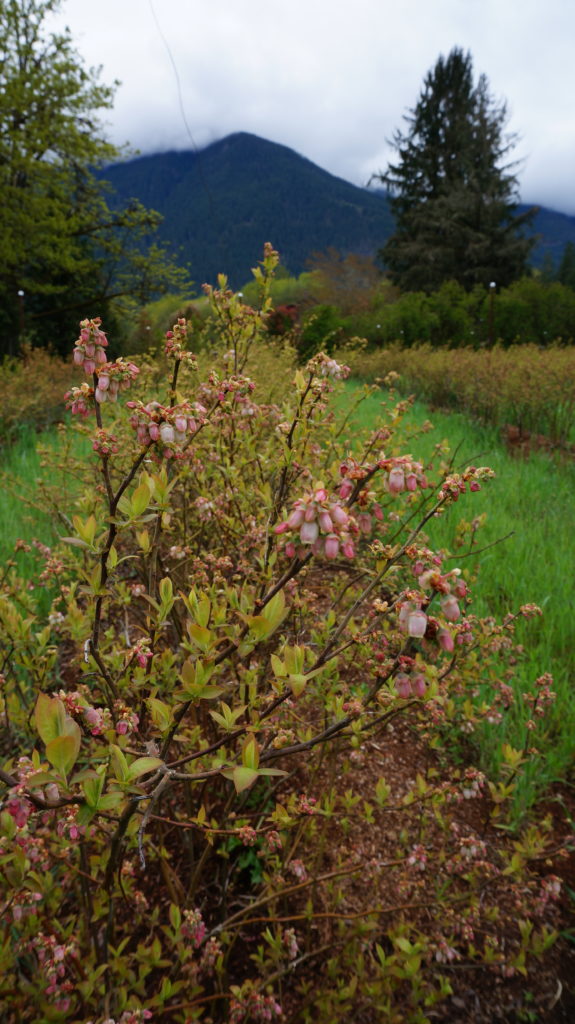
Photo: Rachel Van Boven
By then she was married, and one day her husband Mike picked up a hitchhiker named Gene Kahn. He had recently started Cascadian Farms, an organic fruit and produce farm, and he was looking for workers, so Anne went to work for him. Cascadian grew to be 500 acres, and Anne helped manage the 100 workers there, until, 11 years later, she left to focus on her own farm fulltime. She started Blue Heron Farm in 1981 and committed to it fulltime in 1991.
“How I started farming was kind of by accident,” Anne says. “I fell into it. The more that I learned about it, the more I was attracted to it. I loved working with the cows, I loved how much there was to learn, and I really loved being outside, so it all kind of came together.”
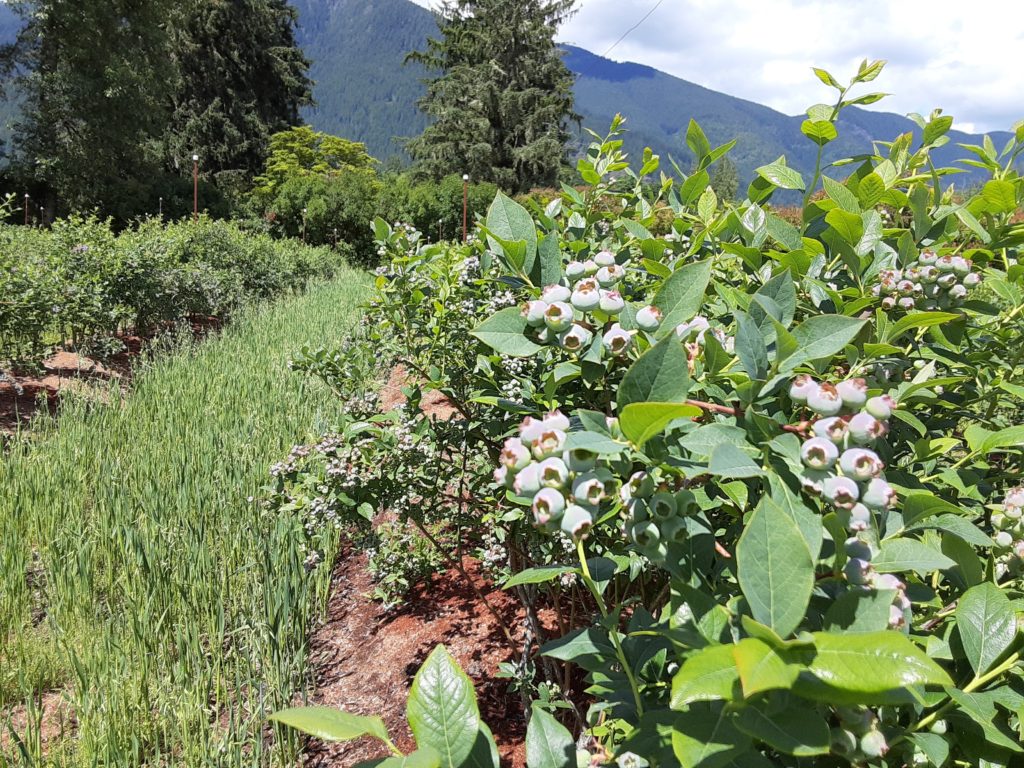
From the start, Anne was deeply passionate about organic agriculture, and has been certified organic from the beginning. She helped write the organic standards and regulations in Washington State and was very engaged in harmonizing West Coast standards with national standards. She dedicated much of her time to pushing for a national organic certification program and spent a lot of time “schlepping back and forth to DC,” writing regulatory language and testifying at meetings.
Anne has dedicated 25 years to crafting organic standards for produce and for humane living conditions for livestock. The federal organic standard for the humane living conditions of livestock and poultry has never been completed, and she’s still pushing for that. “But now I try to do as little as possible,” she says with a laugh. She still serves on the board for the Tilth Alliance, The Northwest Agriculture Research Foundation (NARF) and on an advisory board for WSU’s Center for Sustaining Agriculture and Natural Resources, (CSANR). She has also been working with a coalition of partners to create a new advocacy organization: The Coalition of Organic and Regenerative Agriculture (CORA). NOTE: Always be skeptical if a farmer tells you they’re slowing down.
After all those years, Anne’s still passionate about organic certification, and believes for farmers, “It’s important to prove that we’re always trying to do a better job, and that we’re looking at our farm plan, and that we’re looking at soil building, and that we’re being held accountable for it.” And she believes that it’s important for organic certification programs to keep their standards a “participatory, transparent process.” She has also passionately advocated for making true cost accounting part of our conversations about food – discussing all the upstream and downstream costs that impact individuals, communities and our natural resources—things we don’t typically see discussed in the farm and food system. “It’s just a complex world that farmers face. The challenges, they don’t take well to 30 second sound bites, because they’re complicated. There are a lot of different sides.”
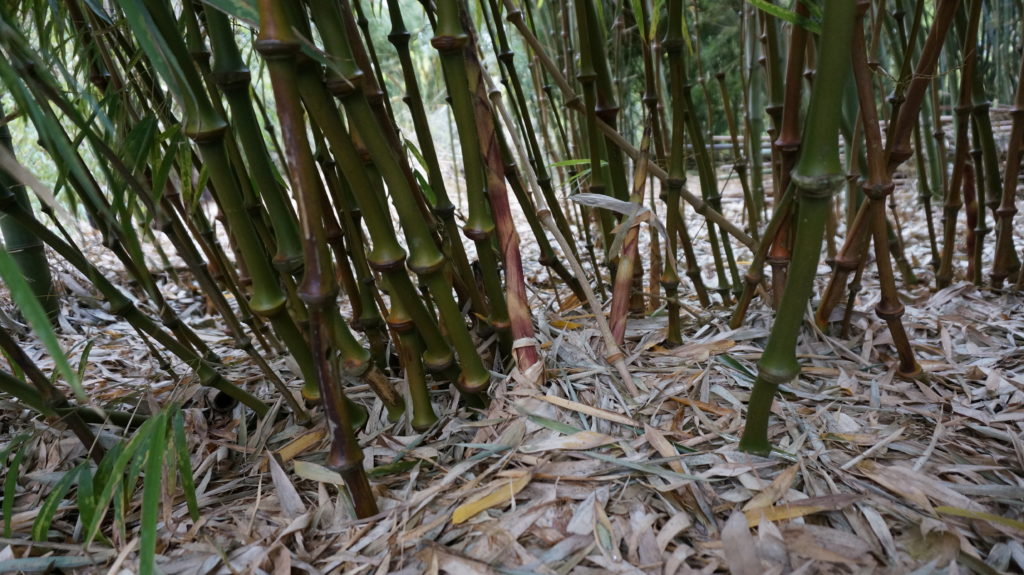
Photo: Rachel Van Boven
First and foremost, though, Anne is a farmer. And her ability to understand that the issues all farmers face don’t have black and white answers has contributed to her success as an organic farmer in an agricultural community that is close-knit and diverse. She attributes her success to the help she’s received from that community along the way.
Anne has good relationships with several of the larger farmers in the Skagit Valley who represent a range of growing practices from organic to conventional – Dave Hedlin and Serena Campbell, Ray DeVries (Ralph’s Greenhouse), and John Roozen. When she first met many of the established family farmers in the Valley, most of them thought she was misguided for not spraying chemicals on her farm. And when it came to her ideas and their ideas about the best way to farm, she says she came in with an “us versus them” attitude. But her perceptions changed over time. “When you sit in meeting after meeting with people, and you see their passion and how hard they work and how devoted they are, I realized, we need all these farmers to survive.” She could see that they were just trying to save their 3rd or 4th generation farms.

Photo: Rachel Van Boven
One of those farmers offered to grow all of her transplanting starts the year her mom died. And in 2001, her barn burned down, and she lost a crop of garlic that was drying in the barn and her tractor. One of the farmers overheard her talking about needing a new tractor and offered one until she had the time to buy a replacement. “At 7:00 the next morning, he had one of his crew drop off a 50 horsepower International Harvester tractor and they said, ‘Call me when you’re done.’” Another has loaned her equipment and let her deliver pallets of vegetables to his farm for pick-up by a mutual buyer. Of the community of farmers in the Skagit Valley, Anne declares, “The camaraderie and support was mind-blowing, and it really has been life-changing.”
Anne realized over time how important is for all the farms in the Skagit Valley to survive. She realized, “I could easily get lime [an important mineral for farming in the rainy northwest] and tractor parts because there are hundreds of other farmers here that go to the five tractor dealerships in the Skagit Valley.” People in other parts of the state have to pay to have lime or tractor parts delivered to them. “As I learned more and more about the structure of agriculture, I really came to understand that we need us all to survive. Nobody likes spreading pesticides, but they have to do what works. They’ve been pushed into a wall.” Anne’s conclusion after all these years working in agriculture is, “The policies that evolved around agricultural research, price supports and access to capital are just such a mess that most of our farmers are struggling to earn a living and we’re all backed into a corner all the time.”
But Anne has continued to engage despite these challenges. “Fortunately, I am NOT a perfectionist. If you’re a perfectionist, it’s really hard to be a farmer! I can’t imagine how hard it would be on my brain to accept all the things that I don’t get done. That is certainly a challenge and an opportunity to just constantly be practicing being in the moment and being grateful for each thing you get done and pausing for a moment to be grateful. To say, ‘Wow, look at that! That looks great. I can walk away from that now – YES!’”
On top of everything else, Anne has been a volunteer firefighter and an EMT in her small community for 40 years. Her experience doing that work has made her grateful for each day. “We live in paradise, we are surrounded by an incredible community of people and there are so many blessings to count.”
“When you sit in meeting after meeting with people, and you see their passion and how hard they work and how devoted they are, I realized, we need all these farmers to survive.”
As Anne starts to move into retirement, she is planning for passing her successful farm business model onto the next generation. Through a process called “Non-Familial Succession,” Anne is hosting and mentoring former farm employees on her land. She is providing these new farm business owners with equipment, facilities, greenhouse space, a walk-in cooler, packing shed, and her expertise. In exchange, they pay her back by working a small number of hours each month on her farm. This can be a challenge during the busy summer months, but Anne’s goal is to help them successfully start their own farms. “The farmers [Long Hearing Farm] that are taking over my scene here and my friend Rocelia Flores Cruz [La Esperanza Farm], who is farming in Burlington now, you know, we all love each other and have so much respect for each other, and I’m so grateful that I can help.” She thinks back to all the help she received from 3rd and 4th generation farmers over the years. “None of us can do this alone, so I’m trying to be as helpful to my former employees as other farmers have been to me.”
Someday, Anne will really retire. She admits she’s still working more than she intended but that work remains very rewarding. What she’ll miss most about farming is the people. “When you have a team that believe in what you’re doing and everybody is working together and you’ve all busted your ass and you’re exhausted and then you look and you see, oh, there’s 30 tons of carrots or 10 tons of squash or whatever it is, for all these people that get your CSA every week that love what you do. The feedback is so rewarding.” Anne will probably always be a farm mentor in the Skagit Valley, and the valley’s lucky to have her.
References
[1] https://s3.wp.wsu.edu/uploads/sites/2073/2014/02/ag-stats-2015.pdf
[2] https://www.nass.usda.gov/Publications/AgCensus/2017/Online_Resources/County_Profiles/Washington/cp53057.pdf
